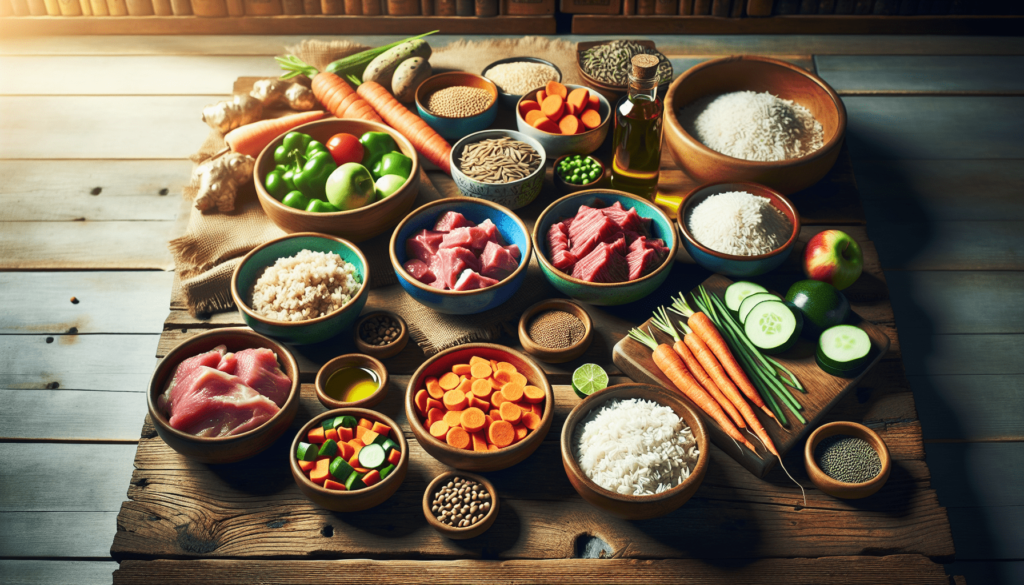Have you ever wondered if homemade dog diets are recommended? As a loving pet owner, I strive to provide the best for my furry friend, and I imagine you do too. With so much information and myriad opinions out there, deciding whether to go the homemade route for dog meals can feel overwhelming. Let’s break it down together and delve into both the benefits and challenges of preparing home-cooked meals for our canine companions.

Understanding Homemade Dog Diets
Diving into the world of homemade dog diets involves more than just whipping up any old meal that would satisfy a human. It requires a deep understanding of a dog’s nutritional needs and how to meet them with safe, balanced ingredients.
The Basics of Canine Nutrition
Before preparing meals, it’s crucial to know what nutrients a dog needs on a regular basis. Dogs need a balance of proteins, fats, carbohydrates, vitamins, and minerals to maintain optimal health. Each nutrient plays a specific role—from proteins that provide essential amino acids to calcium crucial for strong bones. Unlike humans, dogs metabolize food differently, so it’s important not to extrapolate from people’s diets.
Benefits of Homemade Dog Diets
Why consider a homemade diet for your dog? Firstly, you have full control over the quality and source of the ingredients. This allows you to eliminate fillers, artificial additives, and preservatives. Additionally, a customized diet can be tailored to suit individual health needs, such as allergies or digestive issues, thus enhancing your dog’s overall well-being.
Challenges and Risks
However, homemade does not always mean better. Committing to a homemade dog diet involves a significant amount of research and planning. It’s a fine line to walk to ensure your dog isn’t missing out on any vital nutrients. Nutritional imbalances can lead to serious health issues, so consulting a veterinary nutritionist is often advisable.
Crafting a Balanced Dog Diet at Home
Let’s explore how you can balance the nutrients your dog needs through a homemade diet.
Choosing Quality Ingredients
Much like a chef selects premium ingredients to craft gourmet meals, the same goes for your dog’s meals. Choosing high-quality proteins such as chicken, beef, lamb, and fish can provide the foundation of a nutritious diet. Likewise, healthy fats, whole grains, and vegetables offer essential nutrients and fiber. Always ensure that the ingredients are safe for dogs, as some human foods can be toxic.
Understanding and Planning Nutritional Balance
Creating balanced meals is more intricate than just mixing meat and vegetables. Dogs require certain ratios of nutrients—often a daunting task for those not trained in animal nutrition. Consider consulting recipes designed by professionals or even employing software tools specifically designed to balance pet diets.
Alternative Supplements
Even with the best intentions, there might be gaps in your homemade diet. This is where supplements come into play. Common supplements include calcium, multivitamins, and omega-3 fatty acids. However, it is crucial to get professional advice to avoid over-supplementation, which can be just as harmful as deficiencies.

Success Stories: Real-Life Testimonials
Many pet owners who have tried homemade diets have reported improvements in their dog’s coat, energy levels, and overall health. Let’s look at how some like-minded individuals have transformed their pets’ lives through homemade meals.
Hero the Labrador: A Case Study
Hero, a Labrador plagued with allergies, experienced chronic skin conditions and gastrointestinal issues. After switching to a homemade diet of hypoallergenic ingredients under the guidance of a veterinary nutritionist, Hero showed remarkable improvement in health and vitality.
Sasha’s Journey from Picky Eater to Enthusiast
Sasha, a notoriously picky eater, would refuse most commercial dog foods. Her owner decided to try a homemade diet, carefully trialing different protein and vegetable combos until they found a perfect match. Sasha now eagerly anticipates her meals, maintaining a healthy weight and lustrous coat.
Common Misconceptions about Homemade Dog Diets
There’s a lot of misinformation surrounding homemade dog diets, which can complicate decision-making.
Myth: All Human Food is Suitable for Dogs
A major misconception is that all human food is appropriate for dogs. While it’s tempting to share your meal, some foods, particularly those high in spices, fat, or certain chemicals, can be harmful to dogs.
Fact: Homemade Diets Require Precision
Homemade diets aren’t a free-for-all. They necessitate precise measurement of portions and nutrient content to ensure that a dog’s dietary requirements are met. Pet owners must exercise diligence and often frequency consultations with veterinarians to maintain the right balance.
Expert Opinions on Homemade Dog Diets
Expert opinions can provide us with valuable insights into whether homemade dog diets are indeed recommended.
Veterinary Point of View
Veterinarians often caution dog owners to proceed carefully with homemade diets to avoid unintentional malnutrition. They underscore the importance of devising diets in collaboration with trained professionals, emphasizing that even a small lapse can detrimentally affect a dog’s health.
Nutritionists’ Insights
Animal nutritionists point out that when done correctly, homemade diets can parallel or even surpass commercial options. However, they remind us that precision and ensuring a diet fits the unique needs of each individual dog is key.
Transitioning to a Homemade Dog Diet
Creating a custom diet is one thing, but transitioning your pet to it without causing digestive upheaval is another.
Gradual Introduction
To safely transition to a homemade diet, it’s best to gradually introduce homemade meals alongside the current commercial food. Start with small amounts, gradually increasing over the course of a week or two while monitoring for any digestive issues or allergic reactions.
Monitoring and Adjusting
Once fully transitioned, continuous monitoring remains important. Keep an eye on your dog’s weight, coat condition, and energy levels. Consulting a vet for regular check-ups ensures that the diet remains sufficient as the dog ages or as health needs change.
Frequently Asked Questions
Are Homemade Dog Diets Recommended?
Homemade diets can be recommended for dogs provided they are carefully planned and executed with professional guidance. They offer personalized nutrition that can cater to a dog’s specific needs.
How Can I Ensure My Dog’s Homemade Diet is Balanced?
Consulting with a veterinary nutritionist or using a recognized pet diet formulation tool can help ensure that homemade dog meals are balanced appropriately.
What Foods Should I Avoid When Preparing Homemade Dog Food?
Avoid toxic foods such as chocolate, grapes, onions, garlic, and certain sweeteners like xylitol. Also, be cautious of high-fat and highly seasoned foods.
How Often Should I Consult a Vet When My Dog is on a Homemade Diet?
Regular veterinary check-ups, at least annually or as recommended, are crucial to ensure that a homemade diet continues to meet your dog’s nutritional needs.
In the end, deciding whether to embark on the journey of preparing homemade meals for your dog boils down to what best suits your lifestyle and your pet’s individual health demands. With careful planning and expert consultation, a homemade diet can be a healthful choice for your cherished canine companion.



